 Really, this guy's so good looking—especially if you go for wonky men with GOOD HAIR and a great pair of horned-rims. He's so… so… writer-ly.
Really, this guy's so good looking—especially if you go for wonky men with GOOD HAIR and a great pair of horned-rims. He's so… so… writer-ly.
But he can't get a break in the media, at least not on Twitter—which is where it all started.
In promoting his newest novel, Crosswords, Jonathan Franzen's publishers touted him as "THE leading writer of his generation" (caps mine).
That's a statement bound to get a reaction. And it does.
One writer quickly retweets that no matter how lauded and applauded any female author's works are, SHE "will never, ever, be called 'the greatest living American writer.'"
In that same publicity announcement, the publishers go on to tweet that Franzen, in this newest work, places the family in all its "intricacy" at the book's center.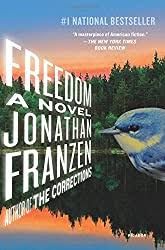 So this gets Roxanne Gay to wondering. Gay (no slouch herself, btw) tweets back asking… Hey, wait. Haven't ALL Franzen's novels centered on the family? In other words, what's the big deal about THIS one that earns him kudos as THE GREATEST WRITER? She's sort of like… ah, c'mon!
So this gets Roxanne Gay to wondering. Gay (no slouch herself, btw) tweets back asking… Hey, wait. Haven't ALL Franzen's novels centered on the family? In other words, what's the big deal about THIS one that earns him kudos as THE GREATEST WRITER? She's sort of like… ah, c'mon!
Then a guy who writes for an online journal jumps into the DUMPSTER FIRE with these choice words: "Franzen’s a good novelist. Sorry?"
But what does he even mean? Why "SORRY?" Is he sorry because he refers to Franzen as "good" but not "great"? Or is he sorry that others are resentful? Or sorry for himself? And what's with the QUESTION MARK at the end of "sorry"?
Anyway, it's all nutz.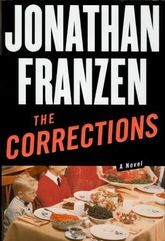 You may remember, 20 years ago, Franzen made literary headlines by dissing Oprah, who had chosen his family-centered novel, The Corrections, for her book club. But Franzen declined!! He didn't want his work given the imprimatur of a woman's book-club pick—because then…omg, MEN WOULDN'T TOUCH IT.
You may remember, 20 years ago, Franzen made literary headlines by dissing Oprah, who had chosen his family-centered novel, The Corrections, for her book club. But Franzen declined!! He didn't want his work given the imprimatur of a woman's book-club pick—because then…omg, MEN WOULDN'T TOUCH IT.
So poor Franzen, there he was, seemingly dissing both Queen Oprah AND women. Whoa! A trifecta (minus one).
Hold on—not so fast. Novelist Meg Wolitzer (no slouch either) has pointed to the same phenomenon, that men don't want to read novels about complex relationships—uh, no thanks, that's for GIRLS.
Let's be honest: Franzen's and Wolitzer's comments say more about men's sensibilities than women's. (See our jokey posts on co-ed book clubs—this one and this one, too.)
One more thing. I had the thrill of hearing Franzen in a live lecture several years back. It was essentially a master class in the ART OF WRITING. Members of the audience, many of them hopeful young writers, asked some of the sharpest, most astute questions I've yet to hear in a lecture—and Franzen was MARVELOUS. Sadly, I can't recall a single thing he said. But I do remember the hair. And his glasses. (Did I mention he's good-looking?)
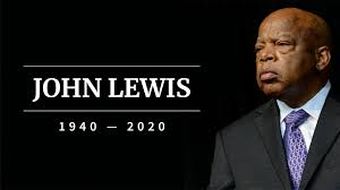 It's perhaps ironic, but surely iconic, that a GIANT of the Civil Rights Movement has died in the midst of the country's protests over George Floyd's death and ongoing racism. That "giant," of course, is U.S. Congressman John Lewis.
It's perhaps ironic, but surely iconic, that a GIANT of the Civil Rights Movement has died in the midst of the country's protests over George Floyd's death and ongoing racism. That "giant," of course, is U.S. Congressman John Lewis.
In 1998, Lewis (along with writer Michael D'Orso) penned Walking with the Wind, his memoir about growing up on the family's cotton farm in Alabama, his recollections of Jim Crow laws, and his role as a YOUNG LEADER of the Civil Rights Movement of the 1960s.
The Washington Post referred to Walking with the Wind as "the definitive account" of the Civil Rights Movement, declaring it "impossible" to read … "without being moved."
The memoir was reissued in 2015. Two years later, in 2017, Lewis's book went to the top of the bestseller charts—with Amazon announcing it had RUN OUT of new copies, while used ones were going for nearly $100.
Lewis, working with two young writers/illustrators, also published March, a GRAPHIC-NOVEL TRILOGY about the Civil Rights era. The third book of the trilogy won the 2016 National Book Award.
When Book One of the trilogy came out in 2013, Lewis said this about the March project: "It's another way for somebody to understand WHAT IT WAS LIKE and … I want young children to feel it. Almost taste it. To make it real." 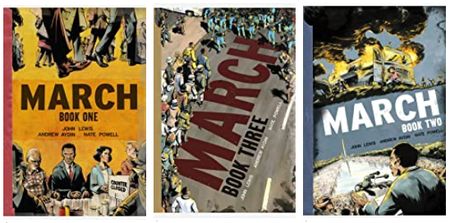
For book clubs that decide to tackle the RACE ISSUE, John Lewis's memoir would be an excellent place to start. Other works of note include the following titles ALSO ON LITLOVERS:
White Fragility
How to Be an Antiracist
Between the World and Me
The Hate U Give
The Warmth of Other Suns
Googling "books on racism," will turn up various lists filled with fine titles. An older one comes to mind immediately: Why Are All the Black Kids Sitting Together in the Cafeteria? (1997), as well as THREE CLASSICS:from the 60s: Black Like Me (1960), The Autobiography of Malcom X (1964), Crisis in Black and White (1964).
Lovely words from the book editors of The New York Times—
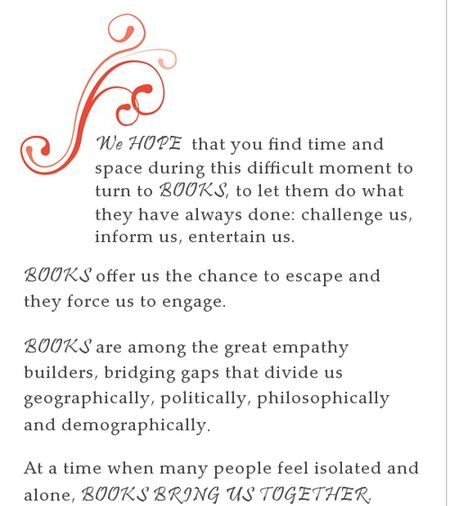
—Letter from the Book Editors
The New York Times Book Review, April 19, 2020
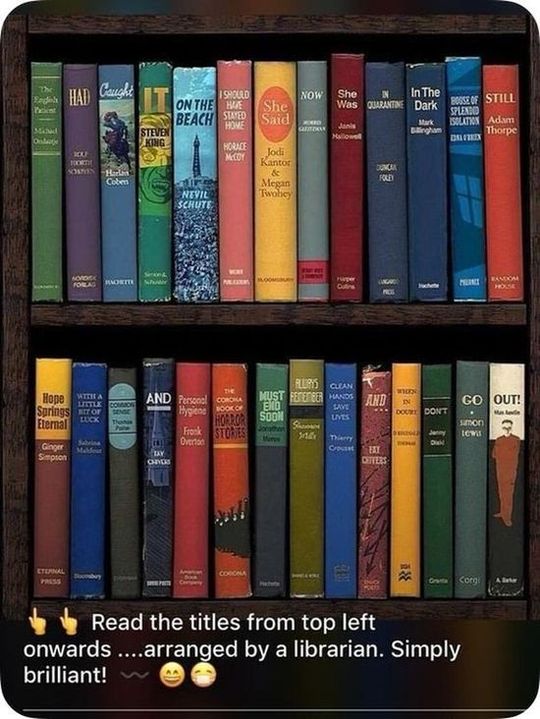
♥ Thanks to my dear friend Sybil.
Btw... the pea-green book—bottom shelf, center—reads: "Always Remember." Even when enlarged, it's hard to read.
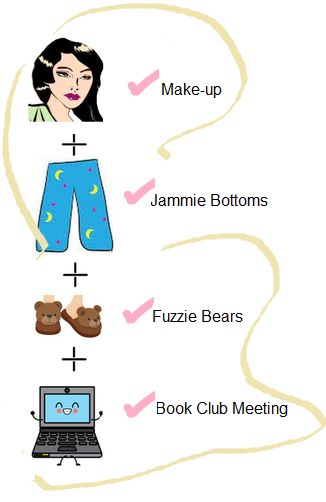 "OK … show of hands: how many of you put on MAKE-UP and a nice top—but still have on your PJ BOTTOMS?"
"OK … show of hands: how many of you put on MAKE-UP and a nice top—but still have on your PJ BOTTOMS?"
That's Mary Field opening the first ever online meeting of the VILLAGE LIT CHICKS of Lewes, Delaware.
"It seemed to break the ice," Mary told me. "Everyone LAUGHED, and off we went! A pretty good start."
The 12 members met on ZOOM, a web-based video conferencing app. All signed in without a hitch … except for one member. But her HUSBAND came to the rescue. (Try to have one of them around; that, or know where you can find a 12-year-old.)
To facilitate a sense of order, Mary assigned each member beforehand a Discussion Question for the book— Chances Are... by Richard Russo.
It worked. Conversation flowed, and "everyone was respectful—with very little talking over each other," said Mary. The meeting was such a SUCCESS that the club has planned its next for May.
One final bonus: members sent thank-you notes to Mary for her DELICIOUS New England-themed DINNER—bread bowls of clam chowder, with chilled beer and wine, topped off by a dessert of Boston Cream pie—all of which she had planned, NONE of which she had to cook. Good job, Mary!
See Meeting in the Time of Corona—Part I.

